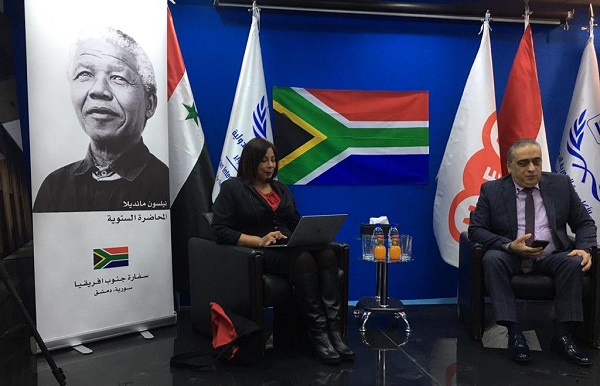Ms.Reneva Fourie, member of the Central Committee of the South African Communist Party delivered a lecture on South Africa’s experience in negotiations,the ups and downs that the country faced and the hard work that it took from all sides to be willing to accept the other.
She says “We hated each other” yet in the heart of their hearts and through a lesson learned the hard way and paid for by blood and tears South Africans managed to bury the hatchet and look forward to a new start.
The lecture covered many points that Syriatimes will shed light on .It started with a question: Why did Ms.Fourie develop an interest in this particular field?
This was her answer:
I developed an interest in this topic when I, after having served as the head of the office of South Africa’s Deputy Minister of Cooperative Governance, was appointed as Secretary General of the African Ministerial Conference on Decentralization and Local Development (AMCOD), based in Cameroon.
While I experienced significant co-operation from the African Union Commission and the relevant government Ministers and Directors General on the continent responsible for either local government or state interior, my greatest challenge was that the model of decentralization that I was expected to promote did not speak to the realities of the conditions on the African continent. In particular, it did not resonate with countries that were experiencing intra-state conflict.
Furthermore, as the head of the secretariat of the South African Communist Party thereafter, international relations formed a core part of my responsibilities. In addition to interacting with progressive political parties in general, particularly in countries such as Cuba, Venezuela, Palestine, China, and the Democratic People’s Republic of Korea; I also interacted with former liberation movements on the continent; and tried to assist with some of the political challenges that they were experiencing in their countries.
Conflict was an underlying challenge for many of the countries in Africa.
In an endeavor to contribute to the African Union’s Agenda 2063, and particularly its objective to “silence the guns” initially by the year 2020 and now extended to the year 2030, I decided to study how South Africa was able to develop a decentralization model that satisfied all its conflicting parties, for my PhD thesis.
In the year 1990, when negotiations formally started, we as South Africans were deeply divided and poles apart including around what we wanted as a decentralization model for our country.
• As the ANC, we wanted a highly centralized, unitary state;
• White political parties like the National Party and the Democratic Party, wanted a devolved, federal state; and
• Political parties like the white, right-wing Conservative Party and the Freedom Front, as well as the Zulu-based Inkatha Freedom Party and some other former Bantustan leaders, wanted independent states.
I wanted to understand how it was possible for South Africa to devise a model that could accommodate the diversity of interests sufficiently to enable it to be accepted by all.
Editor-in-Chief
Reem Haddad

